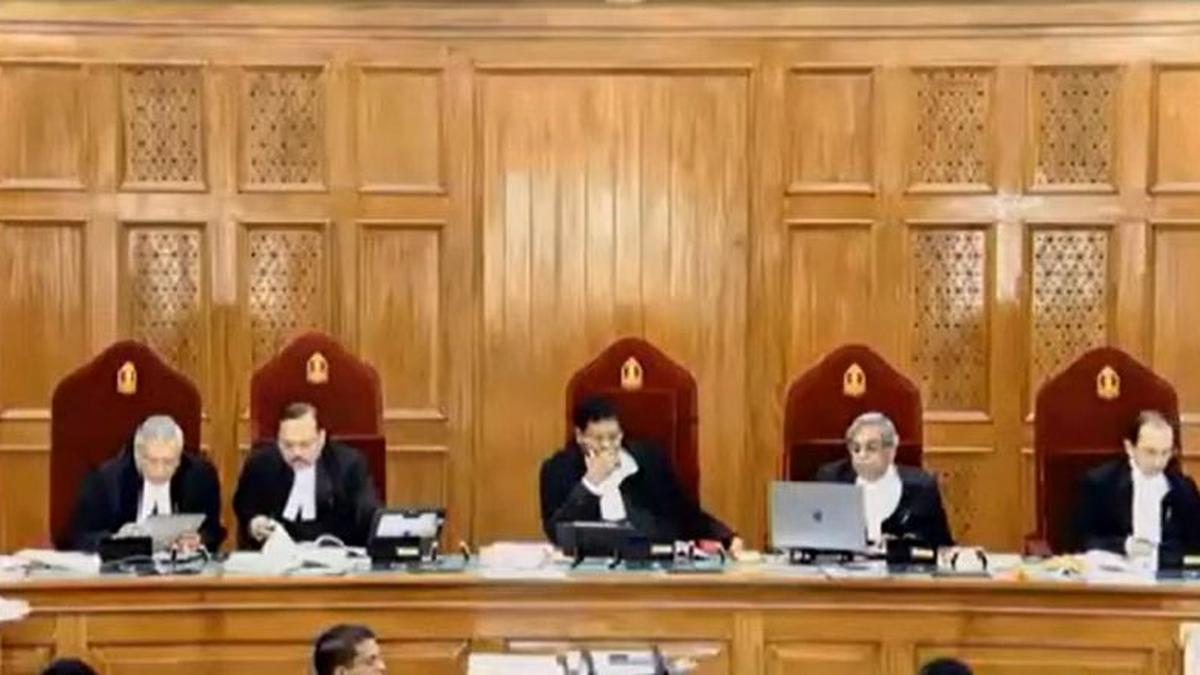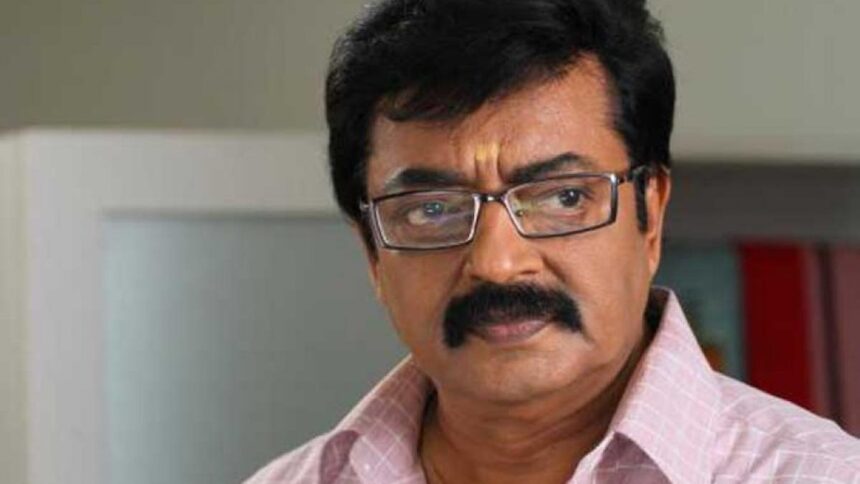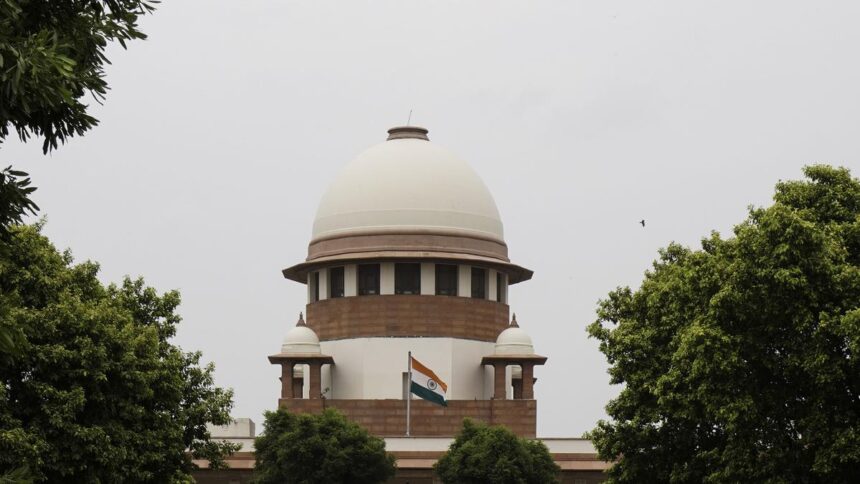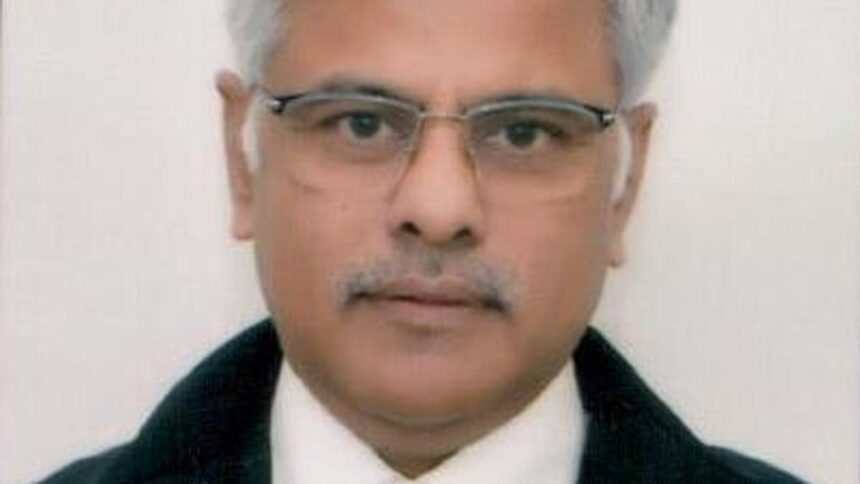
A Presidential Reference Bench headed by Chief Justice of India B.R. Gavai hears arguments on September 2, 2025. Photo: YouTube/@SupremeCourtofIndia-1950
Three of the five judges on the Presidential Reference Bench on Tuesday (September 2, 2025) orally observed, along with the States of Tamil Nadu and West Bengal, that Governors cannot sit endlessly over Bills placed before them for assent.
Chief Justice of India B.R. Gavai, Justices Vikram Nath and P.S. Narasimha separately remarked that Governors could neither delay the wisdom of the legislature indefinitely nor impede the functioning of the Constitution. “No organ can impair the functioning of the Constitution,” Justice Narasimha said.
Tamil Nadu, represented by senior advocates A.M. Singhvi and P. Wilson, said Governors “cannot assume to be royalty in a Republic” while senior advocate Kapil Sibal, for West Bengal, submitted that high offices under the Constitution must work collaboratively and not combatively with each other.
“When the Constitution is clear that a Governor should act with immediacy, why should he hold back Bills? There is a sense of urgency associated with the Governor’s assent. Legislation is a sovereign act. It cannot wait,” Mr. Sibal emphasised.
Mr. Singhvi said that Bills are meant to realise the felt necessity of the times.
Mr. Sibal argued that “absurdity” would follow if the court agreed with the Centre’s argument that Governors had absolute power to withhold State Bills under Article 200 (Governors’ power to assent to Bills). Countering the Centre, he said States cannot go in search of political solutions to coax Governors’ assent. Gubernatorial delay thwarts the constitutional scheme, he said.
“This Constitution has its genesis in history, but its alignment is with the future… And who decides the future of this country? You five in this case. The future of India is at stake if you give such absurd powers to the Governor,” Mr. Sibal submitted.
The Bench is hearing a Presidential Reference of May questioning time limits placed on the Governors and the President to deal with State Bills. The Reference followed an April 8, 2025 judgment pronounced by a two-judge Bench of the apex court in the case of the Tamil Nadu Governor, who had delayed assent to 10 State Bills since 2020. The Division Bench had imposed a three-month deadline for the President and Governors to decide the fate of the Bills. If the Bills were left pending beyond three months, they would be “deemed” to have received assent and become laws.
The Bench, however, expressed doubts about the court imposing “general” time limits on the President and Governors and granting “deemed assent” to Bills. “What happens if the time limit of three months set by the Supreme Court [in the T.N. Governor judgment] is not followed by the President or Governors,” Justice Nath asked.
Justice Nath queried why it was “deemed assent” alone. “Why cannot the other options – withholding assent or reference to the President – also be similarly “deemed”.
The judge debated if fixing “general” time limits would require constitutional amendments. Justice Narasimha said time limits could be prescribed in individual cases after considering the peculiar facts and circumstances of each.
Chief Justice Gavai pointed out that different exigencies and time plans may mark the enactment of different Bills. He said a broad brushstroke of a “general” timeline applicable to all cases of delay may amount to overreaching by the judiciary.
“Timelines help in maintaining discipline and immediacy. This dispute began with individual cases. Kerala and Tamil Nadu came with their own cases. However, the problem [gubernatorial delay] has proven to be endemic and repetitive,” Mr. Singhvi said explaining the reason for the Tamil Nadu Governor case judgment fixing a “general” three-month deadline.
Mr. Sibal said the sovereign act of the legislation cannot be impaired by a recalcitrant Governor.
“He cannot say ‘I choose to sit back and do nothing’. The Governor is not a postman. He has certain play in the joints. If he feels a Bill requires consideration by the President, the Governor can consult lawyers, etc., and refer it… the Governor is not a postman,” he said.
“If he feels a Bill requires consideration by the President, the Governor can consult lawyers, etc, and refer it. He can also send the Back to the Assembly, making suggestions for amendments. That is how it works, through a collaborative exercise of constitutional authorities. The Governor is actually the Executive delivering the will of the legislature to the people of the country. He is the vehicle… The basic principle of constitutional law is when there is interaction between the Legislature and Executive there must be a level of amity and cooperation to make the Constitution work,” Mr. Sibal said.
Published – September 02, 2025 10:30 pm IST























